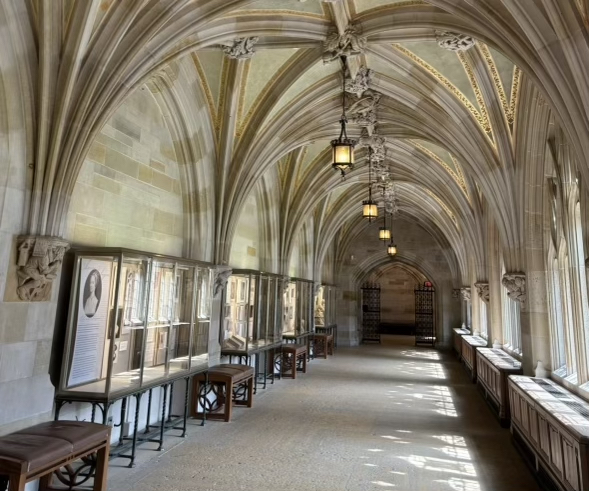Vanderbilt junior Ommay Khyr won second-best speaker in the Non-Native, Heritage Undergraduate category at the 2024 Yale National Hindi Debate on April 19. Established in 2008 with support from Yale’s MacMillan Center for International and Area Studies, the competition featured 20 debaters spanning 10 universities.
Undergraduate and graduate students studying in the U.S. with any level of Hindi proficiency are eligible to participate in the debate, which is divided into three categories: Non-Native, Non-Heritage; Non-Native, Heritage; and Native. Khyr said she was eligible for the heritage category due to being born in Lahore, Pakistan, and having spoken Urdu since youth.
“Her achievement shatters the misconception that Hindi and Urdu are divided along national/communal lines,” Vineet Gupta, lecturer in Hindi-Urdu, said. “These languages represent the shared culture of South Asia with a rich intertwined history…At the HNUR department, one of our primary goals is to foster this spirit.”
Whereas competitors typically have two months to prepare for the debate, which is structured as individual, three-minute memorized orations, Khyr said she found out she was eligible for the competition only one week prior. This year’s “motion” for the heritage category was “Immigration policies should prioritize skilled immigrants” — a stance that Khyr opted to speak against.
With the guidance of Gupta and Divya Chaudhry, senior lecturer in Asian Studies, Khyr said she spent the week prior to the competition writing her speech, which she memorized in the two days prior to the debate.
“I have debated since eighth grade, in English, so the idea in my brain was to write and research my arguments in English first, and then I translated them into Hindi,” Khyr said. “After I did that, I showed them to Vineet Ji…who looked over it and would say ‘this is a more academic word you could use there…’ and if he understood them.”
Khyr is majoring in chemistry but transferred to Vanderbilt at the start of the 2023-24 school year for its opportunities in South Asian Studies. She said she learned how to write in the Devanāgari script last semester, prior to which she did not know how to read or write in Hindi. This semester, she was the only student in Gupta’s HNUR 3302 course, a Hindi intensive.
“[I’ve been taking these classes] for fun — it also covers my language requirement, and I grew up Pakistani,” Khyr said. “One of the reasons [I transferred] was the department [of Asian Studies] because I wanted to take classes on South Asian culture and language.”
Khyr emphasized the importance of pursuing one’s passions, even if not aligned with students’ career aspirations.
“One of the things it gets hard to do at Vandy is follow the things you like to do because there is so much pressure from being pre-med or a hard major,” Khyr said. “This competition was really fun for me because it’s something I enjoy doing — I love debating, and I love the language. If you choose extracurriculars you enjoy doing, you’ll have fun and do much better than if you’re trying to force yourself to fit into a box.”
Gupta called Khyr’s accolade “a proud moment” for Vanderbilt’s Hindi-Urdu instructors and expressed hope that the news would inspire more to enroll in language courses.
“[This] is the first-ever award won by a Vanderbilt student at a national-level Hindi debate competition,” Gupta said. “Collectively, [Hindi and Urdu] are the third-most spoken languages in the world and deserve as much recognition as any other language. I earnestly hope that Khyr’s achievement will inspire more students to take Hindi-Urdu language classes.”



